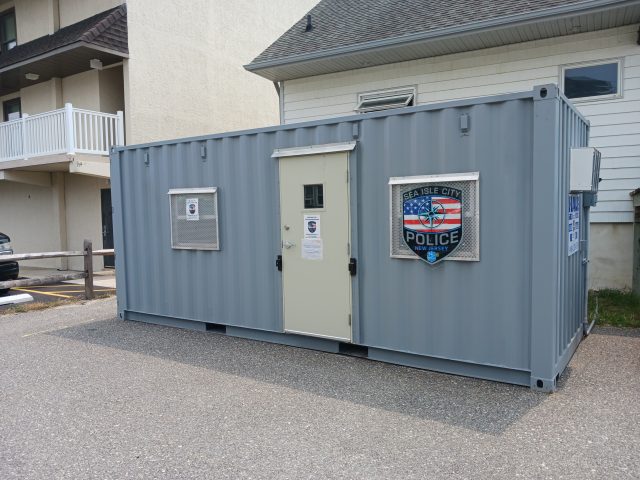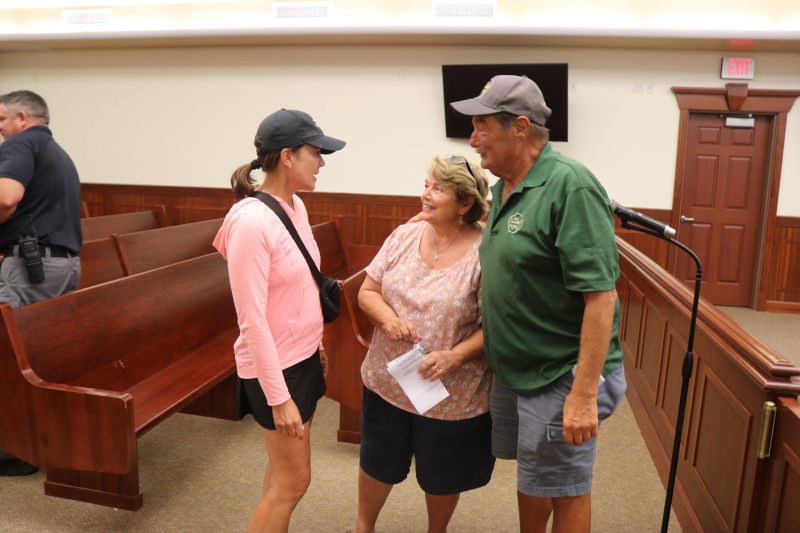
By DONALD WITTKOWSKI
After taking “matters into our own hands,” Sea Isle City’s local strategy to prevent large groups of rowdy teenagers from disrupting the summer tourism season seems to be working so far, Mayor Leonard Desiderio said Tuesday.
At the start of summer, Sea Isle imposed a new 10 p.m. curfew for minors under the age of 18 and a backpack ban between the hours of 10 p.m. and 1 a.m. for juveniles and adults that will remain in effect until Sept. 15.
In remarks at a City Council meeting Tuesday, Desiderio said the new measures have largely been successful in keeping crowds of unruly teens from congregating on the beaches or oceanfront Promenade late at night and causing trouble.
“As everyone knows, we didn’t get the help we wanted, so we took matters into our own hands and implemented local common-sense laws that have proven to be very effective this summer,” Desiderio said.
As he has done repeatedly in the past, Desiderio expressed his frustration with the state Legislature for not passing new state laws to help beach communities like Sea Isle prevent outbursts of rowdy behavior, including underage drinking, theft and vandalism.
Desiderio said Sea Isle officials decided to toughen their local ordinances after the Legislature refused to repeal state laws that place limits on police in dealing with troublemaking juveniles. For instance, under state law police may only give “curbside warnings” to teens who are drinking alcohol or smoking marijuana in public.
“We made repeated requests to our state legislators to assist by rolling back some of the ill-conceived laws and directives put into place over the past few years that created the issues with juveniles,” Desiderio said.
Desiderio was referring to Gov. Phil Murphy’s juvenile justice reforms that restrict police in how far they can go in dealing with teens who drink alcohol or smoke marijuana in public. Essentially, police can only give them verbal warnings instead of taking them into custody or notifying their parents.

Sea Isle chose to develop its own strategy to curb teen rowdiness by imposing a new curfew and backpack ban.
“It has been working,” Desiderio said. “We’re not perfect yet, but we’re going to get there.”
Juveniles are not allowed out from 10 p.m. to 6 a.m. on the beaches, the Promenade and the beach blocks unless they have a legitimate reason. There are exceptions for minors who are accompanied by adults, are going to or returning from their summer jobs or are participating in formal activities such as recreation programs.
Police will give juveniles at least two warnings to go home if they are out after curfew. Only if the juveniles ignore repeated warnings will police have the authority to take them into custody and call their parents. They will not be arrested, but are taken to a police substation at 40th Street and the Promenade to wait for their parents to pick them up.
“They are out there, rounding juveniles up,” City Business Administrator George Savastano said of the police department’s enforcement of the curfew.
Sea Isle Police Chief Anthony Garreffi said that in at least two instances this summer, parents were given summonses when their children repeatedly violated the curfew law.
During remarks at Tuesday’s Council meeting, Garreffi reported that the curfew has been working “great.”
However, in some cases rowdy teens simply move off the beaches and Promenade to cause trouble in other parts of town where police may not be patrolling at that moment, Garreffi said.

City Solicitor Paul Baldini noted that Sea Isle used a curfew law that Dallas has in place as a model. The Dallas curfew faced legal challenges, but was upheld as constitutional by the U.S. Supreme Court.
Baldini said Sea Isle expected legal challenges to follow Sea Isle’s approval of the curfew, but so far there have been none.
“The city is committed 100 percent to this ordinance. We’re going to continue to use it,” Baldini said.
In another measure to help police prevent trouble from breaking out on the Promenade, adults and juveniles are not allowed to carry backpacks between 10 p.m. and 1 a.m. each night. Sea Isle approved the backpack ban largely to prevent juveniles from concealing alcoholic beverages or weapons.
There are exceptions in the backpack ban for police officers, fishermen out on the beach, equipment used by journalists and people carrying medical devices.
Garreffi said that no summonses have been issued yet for backpack violations. With the curfew taking effect at the same time as the backpack ban, it has effectively eliminated the problem of juveniles carrying backpacks after 10 p.m.
“The timing of the curfew is taking care of both issues,” Garreffi said.
As the tourism season enters its final few weeks, Desiderio credited Sea Isle’s police department for doing an “outstanding job” overall of curbing teen rowdiness this summer.

Three residents who spoke during Tuesday’s Council meeting also praised the police department for dealing with rowdy behavior. At the same time, they asked Sea Isle officials if the city could do even more to prevent teens from drinking and urinating in public, littering, making excessive noise and trampling the dunes.
Donna Bradley, a resident of 61st Street, said she collected an entire trash bag of discarded bottles and cans after a night of drinking by juveniles. She wondered if the city could force the teens to clean up their litter as punishment.
Mariann Ragucci Albin and her brother, Carmine Ragucci, who live at 60th Street and Pleasure Avenue, also urged city officials at the Council meeting to consider other ways of cracking down on troublesome teens.
Albin also suggested that local residents should form a committee to lobby the Legislature to pass state laws to help Sea Isle and other shore towns deal with bad teens.
Desiderio responded to the residents by saying that the vast majority of visitors to Sea Isle – teens or adults – simply want to enjoy themselves without disrupting the summer vacation season.
“If they don’t like our rules, this is not the place for them,” he said.







